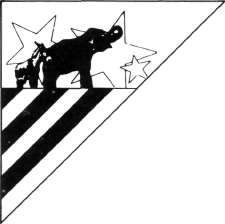 |
Home | Search | Browse | About IPO | Staff | Links |
 |
Home | Search | Browse | About IPO | Staff | Links |
|
Politics By CHARLES N. WHEEL 
1984: Vintage year for Illinois? OVER the years, grim warnings about "1984" have become a cliche, routinely uttered by liberals concerned about stronger governmental police powers and by conservatives worried about increased governmental social involvement. Now, the fateful year is finally upon us, and surprise! George Orwell's 35-year-old prophecies of a powerful, totalitarian state controlled by a few manipulative politicians appear way off base. In fact, as the new year dawns in Illinois, the state's most celebrated political force, the Cook County Democratic machine, is in disarray; the statewide Republican party's ideological schizophrenia is visible again in a potentially bloody U.S. Senate primary; and the most noticeable mind control is being exerted not by, but over, politicians, a phenomenon especially rampant in the General Assembly, where perceived public reaction determines how legislators vote on some issues. For practicioners of the political arts, the new year offers an interesting mix of opportunities and pitfalls; for political aficionados, it promises to be another vintage year of tantalizing situations. Consider, for example, these facets of the March 20 primary. In the Democratic presidential sweepstakes, Walter F. Mondale's diligent headhunters have brought into the former vice president's camp most of the party's professional politicians, including rare pre-primary endorsements from the State and Cook County central committees. But Mondale may not be able to translate the party honchos' blessings into similarly impressive yields of delegates for the Democrats' nominating extravaganza in San Francisco in July. In Chicago's inner city neighborhoods, for example, the Rev. Jesse Jackson could siphon off votes — and convention delegates — from black voters that otherwise would have found the Minnesotan the most appealing Democrat. Elsewhere in the state, U.S. Sen. John Glenn of Ohio may be more appealing to conservative-minded, rank-and-file Democrats who no longer empathize with labor and other traditional New Deal coalition elements which form the backbone of Mondale's support. On the Republican side, President Reagan, of course, will win the presidential preference poll, a meaningless "beauty contest," and also should sweep the delegates for the GOP national convention in Dallas in August. In a decision colored by the longstanding rift between the party's moderate and conservative wings, the Reagan campaign tapped Gov. James R. Thompson as its Illinois chairman, passing over former state Sen. Donald L. Totten, a conservative of impeccable ideological credentials who headed two previous Reagan presidential bids here. The governor's awesome flexibility makes it difficult to pinpoint where he stands on the philosophical spectrum. But he's chairman of the National Governors Association, a formidable campaigner, and he wanted the job. So he got it. In a sense, the same GOP dichotomy is at work in the party's U.S. Senate primary, where Sen. Charles H. Percy's support for Reagan and right-wing causes is under question from U.S. Rep. Tom Corcoran, an Ottawa conservative. The early line favors Percy, a three-termer who's chairman of the prestigious Foreign Affairs Committee, to win the GOP nomination. If so, the experience should sharpen the senior senator's campaign skills for the tough battle ahead in the general election. Among the Democrats, a plausible case can be made for any of the four contenders to win the nomination. U.S. Rep. Paul Simon, an early poll leader, enjoys an unparalleled reputation as a public servant and could benefit from repentant Democratic primary voters wishing to atone for supporting Dan Walker over Simon in 1972. Senate President Philip J. Rock, the state party chairman, has strong support from other party leaders, particularly in Cook County, which still could mean something at the polls. Comptroller Roland W. Burris, the top vote-getter last November, would be the logical beneficiary if black voters turn out in droves, perhaps energized by a Jackson candidacy. And Hinsdale attorney Alex Seith, who ran an unexpectedly strong campaign against Percy six years ago, is counting on his foreign policy experience and against media campaign to emerge from the pack. For legislative watchers, the primary should provide the first empirical evidence of voter reaction to last June's tax increase. The results will come under even closer scrutiny by law-makers if the state's economy is still languishing in mid-spring, raising the prospect of a choice between continuing higher tax rates or short-changing education and human services. In Chicago, the March primary also affords a chance for Mayor Harold Washington to substitute action for rhetoric against his nemesis, Chicago alderman and Cook County Democratic boss Edward R. Vrdolyak. On the ballot will be the city's 50 ward committeemen who along with their 30 suburban township counterparts choose the county chairman. Washington's encouragement of insurgent candidacies against Vrdolyak loyalists would be a calculated gamble but it could pay off with a strengthened hand for the mayor not only in party circles but also in the Chicago City Council, where a committeeman still carries more clout than most aldermen. And the March 20 primary is but an appetizer for the main course, the November 6 general election. Indeed, 1984 will be an interesting year, Orwell notwithstanding. 2/January 1984/Illinois Issues
|